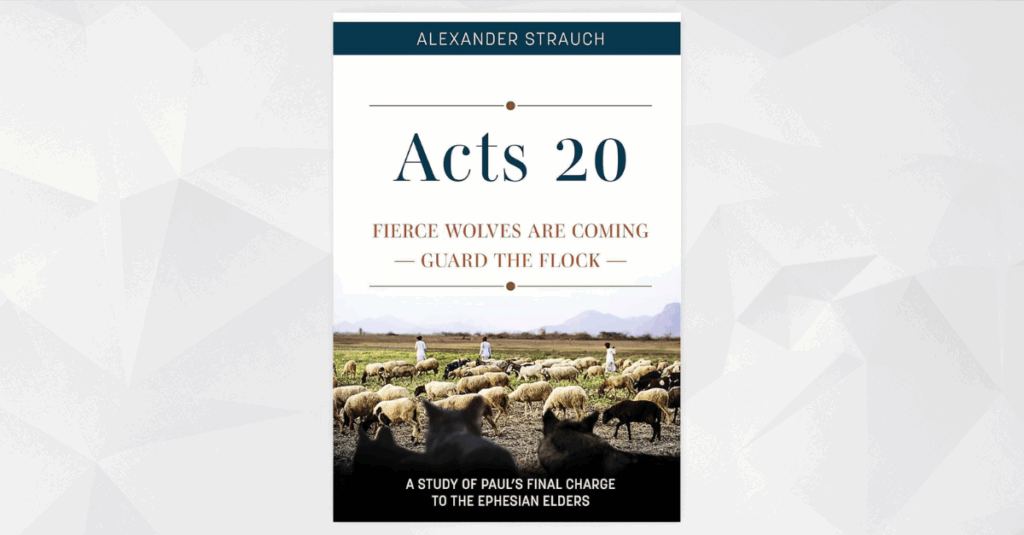Are You Caring for Your Church Like Christ Died for It?
July 31, 2025

July 31, 2025
Alexander Strauch, Acts 20: Fierce Wolves Are Coming: Guard the Flock. Lewis & Roth Publishers, 2021. 232 pages.
Wouldn’t it be great to attend a pastors’ conference where the apostle Paul was the main speaker? Imagine having the chance to hear him give an unhurried address on ministry. I don’t think there would be another pastor’s conference that could compete.
Well, such a conference did occur. Thankfully, the message was preserved, and we have the recordings.
That conference-like setting and ministerial substance are what we have in Acts 20; it’s Paul speaking to pastors about pastoring. Though all Scripture is beneficial, this section is especially helpful to shepherds and worthy of their special attention. And with a sobering precision, Strauch’s Acts 20 fixes our focus on Paul’s final word to pastors—so that we pastor better.
Paul’s message to the Ephesian elders makes clear that danger was coming. Wolves exist and they attack sheep. God’s flock is not in full safety until we arrive in Immanuel’s land. Until then, he has prepared and provided for his people’s safe passage. And part of his plan to keep his church safe is gifting them with pastors—true pastors anchored in the true gospel. The very instructions Paul left to them are available to us. And, as Strauch rightly asserts, they remain just as relevant today:
“The elders needed—as we do today—a compelling and unforgettable challenge to be faithful to their Spirit-appointed task of shepherding God’s flock and guarding the gospel from false teachers” (11).
I loved this book. It managed to strike that rare balance of being easy to read yet theologically deep. The presentation of pastoring was surprisingly thorough and thoughtful. It was humbling. It was compelling. Every page seemed weighted with conviction about the worth and way of shepherding. And it was pleasantly unrelenting in that.
This is a book for church leaders on leading the church. I’d liken it to a leadership course offered at your church. It’s essentially a sermon series on pastoring—and the author plainly says so; “it’s a biblical exposition of Acts 20” (16). And perhaps that’s why I found it refreshing. Maybe I’m being overly critical here, but I find most leadership instruction malnourished. It feels fat on pragmatism and thin on Scripture. But not this book. It’s a twelve-chapter feast on God’s Word.
Strauch is not trying to be clever, but rather biblically clear. It’s not a book full of stories, but instead full of Scripture. And it has a no-frills, no-fluff approach. It’s a steak with no seasoning except for salt and pepper. The result is a body of teaching that is both plain and powerful.
Here’s an example. In my favorite chapter called “Incentives for Guarding God’s Church” (beginning on p. 121), Strauch glories in the incalculable worth of Christ’s sacrifice for the church. His love should fuel and form ours. If God cares for the church so much, how can his shepherds not as well? And to massage that further in, he quotes the inimitable Richard Baxter:
Can you not hear [Christ] saying, “Did I die for these people, and will you then refuse to look after them? Were they worth my blood, and are they not worth your labor? Did I come down from heaven to seek and to save that which was lost, and will you refuse to go next door, or to the next street or village to seek them? How small is your labor or condescension compared to mine! I debased myself to do this, but it is your honor to be so employed. Have I done and suffered so much for their salvation, and will you refuse that little that lies upon your hands?”11 . The Reformed Pastor, (repr. Grand Rapids: Sovereign Grace, 1971) p. 55
And though the quote is fire enough(!), he wrings it for all its warmth by adding: “Every time you look out on the congregation, say this to yourself: These people were purchased by the precious blood of the Lord Jesus Christ. I should regard them as most valuable to God. What an immense honor it is then to love and shepherd God’s people!” (137–138)
That heaviness of call, braided together with encouragement, captures the spirit of the whole book. It’s a slow study marveling at God’s works and then encouraging pastors to faithfully be God’s workers.
This is a much-needed resource. It’s a guided tour through Paul’s conference for pastors. And all of us who are overseers would benefit from the help. It would be perfect to train new elders or to sharpen the whole pastoral team. It’s hard to think of a book on shepherding that rivals this one’s scriptural richness, accessibility, practical breadth, and pastoral gravitas. I hope it gets a wide reading and influences many elders.
I know the churches would be better for it.